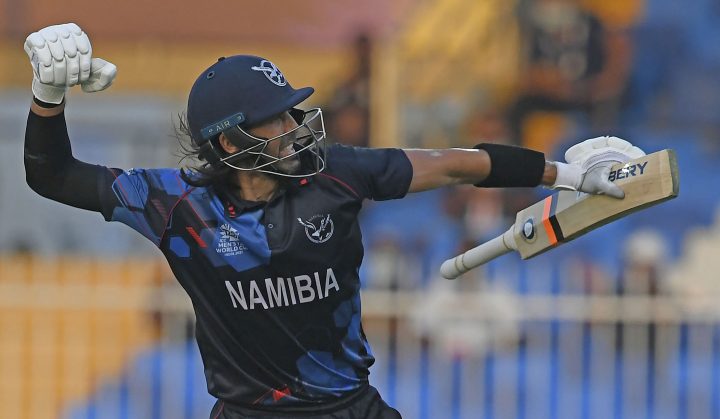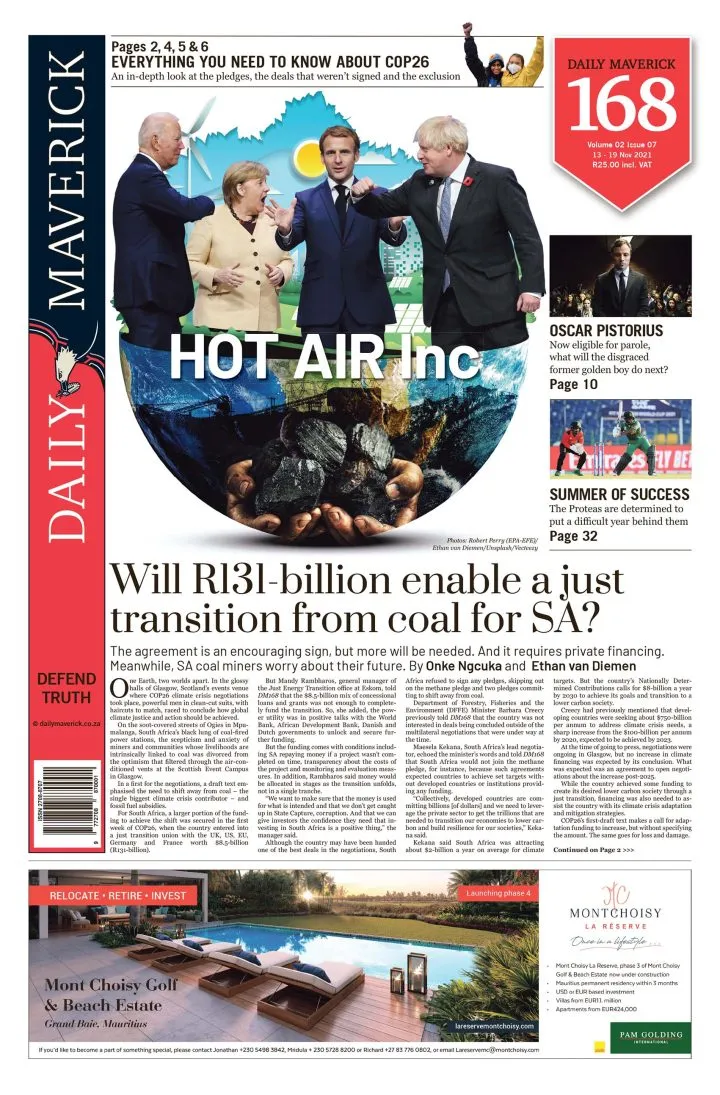CRICKET
Namibia settles into its hard-earned spot at the global high table

The African country proved a thing or two with its impressively strong T20 World Cup campaign.
Gerhard Erasmus had a choice: after breaking the ring finger on his right hand in a “freak accident” in Namibia’s final warm-up match before the T20 World Cup started, he could go home, have surgery and heal up; or numb the pain, play on and risk more damage. For him, the decision was easy.
“The immediate diagnosis was that I should fly back and get an operation, but that wasn’t an option. I just had to get some injections and play,” said Erasmus.
He remembers the incident in graphic detail: “It was during the latter part of our fielding innings against Scotland. The ball was thrown at the wrong end of the stumps and I tried to collect it so there wouldn’t be overthrows. I tripped over the stumps and the ball hit me from the front here,” he says, holding up his finger to the camera.
It’s swollen, a little skew, and the nail bed is bloodied from a subungual hematoma. It looks painful, but he says it’s not – most of the time. “I take numbing injections, so I don’t have feeling in that part of the hand.”
But it does present him with a more technical challenge. “I had to reinvent my grip on the bat and use the other fingers a bit more to really get some power out of there. Mentally, I’ve had to be strong and not let it get to me. Physically, I can’t feel it, so I don’t have pain when I am batting or fielding, but cricket is very much a touch game and obviously you have to have control.”
Transforming history
That’s one of the more unusual lessons Erasmus has learnt from this tournament, which has, most importantly, taught Namibia that they belong at the highest level. For a country that did not have One-Day-International (ODI) status until two years ago, it’s understandable that Namibia had doubts about how well they would match up.
“It’s just about the unknown because obviously things at the associate level operate a little below this level,” said David Wiese, Namibia’s highest-profile player, who qualified to represent the country through ancestry.
“Here, you get guys bowling 145km/h plus, and spinners who do something different. In the Associate teams, you don’t get exposed to that much so when you do it for the first time, you feel like you don’t belong.”
That was an attitude that needed to be changed if Namibia planned to progress to the Super 12s – and it was up to Wiese to drive that process. His status as a former international for South Africa and a PSL superstar helped, as well his ability to take on a senior role and run with it.
“He was so essential in making us believe and blending us into a big tournament like this,” Erasmus says. “He soaks up a lot of pressure but also he just allows the guys to free up their minds. He says to us, ‘You are on this big stage because you belong here and we are going to jol (do it) this here on the field with Babar and with Shaheen Shah Afridi’.”
Erasmus’s use of Afrikaans colloquialisms reveals a small splice of Namibia’s storied history. A former British and German colony, Namibia used to be called South West Africa and was under South African rule until 1990. In that time, it was considered a province of the apartheid state. The same rules of segregation that existed in South Africa were in place in Namibia, creating a white elite who enjoyed the best resources in the country, and an underclass of people of colour.
You don’t have to look much further than the cricket team to see the legacy of that policy. Namibia’s 15-man squad includes only three black players – Pikky Ya France, Zane Green and Ben Shikongo. Their wider 18-man group includes a fourth black player, Mauritius Ngupita. Erasmus is aware that transformation is a topic that must be touched on.
“As a captain and a guy who has been involved with Cricket Namibia from age 16, it’s been so inspirational to see a guy like Pikky Ya France,” he says. “He has carried the mantle for so long and then we’ve had two youngsters came through over the last two years – Ben and Mauritius. Those are the guys who are heroes for the people back home. We need to continuously have players like that so we can create a brand for people to connect to. That’s what we try to do in our culture. If we create a brand of cricket that people love and follow, you will get more people playing cricket and if we will get a lot more cricketers, then cricket won’t be a white man’s sport; it will be a Namibian sport.”
For that to happen, Namibia needs to build infrastructure, especially outside of Windhoek, the capital. That’s where the national team play all their matches and where four of the five domestic clubs in the country are based. Erasmus would like to see cricket facilities elsewhere, specifically in the densely populated (as densely as a country of 2.5 million people can be populated) northern Owambo region.

Namibia’s David Wiese celebrates after hitting the wining shot at the end of the ICC Men’s Twenty20 World Cup cricket match between Namibia and Ireland at the Sharjah Cricket Stadium in Sharjah on 22 October 2021. (Photo: Aamir Qureshi / AFP)
Building a ground will take money, something that Cricket Namibia has in limited supply, although that is changing.
By attaining ODI status in 2019, Namibia qualified for International Cricket Council funding and now, by making it to the Super 12s, they are also attracting sponsors.
Immediately after qualifying, Indian company Ebco signed on as the national men’s team’s main sponsor. And that is not the only opportunity that may come their way through performances at this tournament.
For all they have achieved as a unit, Namibia’s players are also hoping for some individual glory, if they catch the eye of T20 franchise teams.
“That’s the beauty of us playing against teams like Pakistan or India,” Wiese says. “As a player, if you have a big performance there, you never know. All it takes is one innings from anybody here and your life can be changed forever.”
Essentially, that’s what happened to Wiese. “I signed Kolpak [in 2017] with the intention of playing in these franchise tournaments and I went through my first year and I didn’t get picked up anywhere.
“Nothing came along. That was a bit of a wake-up call. At the end of my second year, I got a replacement gig with Lahore Qalandars when Carlos Brathwaite got called up to the West Indies.
“I played my first game in Sharjah and me and AB [de Villiers] had a partnership and I had the six off the last ball to win the game and that was a massive turning point in my career. After that, things started clicking. I got a T10 deal, and BPL [Bangladesh Premier League], and from there it snowballed.”
It’s a chapter that has included a second stint at international cricket, five years after Wiese thought that was behind him, for a country he considers a second home.
“When I was a child, during the holidays, we went to Namibia quite often. My family was in Henties Bay and there was a big holiday home down there.
“As we got older and we had cricket weeks, we couldn’t really go there as much but I’ve still got a lot of family in Namibia, aunts and uncles and cousins.”
He is also contracted to play there until at the least the end of 2022, which is how long Namibia will retain their ODI status.
Although Wiese is committed to the T10 and the PSL, he will play in as many of Namibia’s ODIs as possible, and is aiming for the 2022 T20 World Cup, which they have automatically qualified for.
By then, Namibia would have had another year of cricket under their belts and Wiese expects them to be even more competitive.
“We beat Scotland and cemented ourselves as the best Associate in this tournament. And to see how the guys have grown, playing against better oppositions and realising they can compete. This tour has been a massive success.”
That victory also earned them a mention from their president, Dr Hage G Geingob, who predicted they would also beat Afghanistan. They didn’t, putting in their worst performance of the Super 12s there. But they have since pushed other teams harder. For Erasmus, their performance against Pakistan was a stand-out: “The Pakistan game for me as a whole was one of the greatest moments on this tour. We were in the battle for 30 of the 40 overs.
“The way we held them in the powerplay, and until over 10 or 11, gave my bowlers the sense that we belong. Then with the bat, we really had a crack at them at one stage.
“We were probably not in the chase all the way, but it still gave us a sense of belonging. After that match, I could look into my players’ eyes and see that these guys now feel like they can dance with the best.”
After that match, members of the Pakistan team went into the Namibian dressing room to congratulate them on their journey. While most of the Namibian squad were taken by surprise, Wiese knew what Pakistan had planned.
“The Pakistan team manager is also involved with Lahore and he mentioned that a couple of the guys really want to come and congratulate our team.
“It was such a special moment to see the mutual respect they showed us and to spend a little bit of time with them. It was invaluable to see our [players] speaking to Mohammad Hafeez and Shaheen Shah Afridi.
“It’s moments like that that you can’t take for granted because they don’t go into every team’s changeroom. You have to earn a bit of respect from the opposition [for them] to come in and applaud you. That’s a moment the guys should hold on to and be proud of.”
Knock-on effects
Erasmus certainly is. “As a captain, it’s awesome to see my guys learning and getting exposure at the highest level because I know that will make everyone better individually, and that makes a better team.
“Many knock-on effects will come from this because we have been exposed to the greatest of players around in the T20 circuit and some of the best teams.”
And they have also had the better of some of them. Among the many history-making moments at this tournament, Namibia also collected their first win against a full member, when they beat Ireland to progress to the Super 12s.
That victory was Wiese’s moment of the tournament. He was named Player of the Match for his 2 for 22 and unbeaten 28 off 14 balls, but dedicated his award to Erasmus, who scored 53 not out in the chase.
“He is the heart and the backbone of this team. I have been really impressed with him,” Wiese says. “He is only 26 and his maturity as a leader has been phenomenal.
“The guys look up to him. He leads by example in everything that he does. And that does not even take into account that he is a fantastic player, probably the best Associate batter around.”
At this tournament, Erasmus is second only to Wiese in the Namibian run-scoring charts. And he has been doing all this with a broken finger. Every time the ball is hit Erasmus’s way in the field, he could suffer another break and he may not even be able to feel how bad it is.
“That’s the risk I have been taking. I had to put it in my mind that it’s already broken and it’s just what I have to do. I do have respect for my own body but there is grace in the situation in that I am playing in the World Cup and it’s a special journey and these kind of chances don’t come every day.
“I just have to fix it after this. I will probably go for surgery next week, but I don’t know what the specialist will say. I don’t know how long I will be out for. I don’t think I will lose the finger.”
Fingers crossed. Except, as Erasmus reminded us, he can’t do that quite yet. DM168
This story was first published by ESPNCricinfo.
This story first appeared in our weekly Daily Maverick 168 newspaper which is available for R25 at Pick n Pay, Exclusive Books and airport bookstores. For your nearest stockist, please click here.


















 Become an Insider
Become an Insider
Comments - Please login in order to comment.